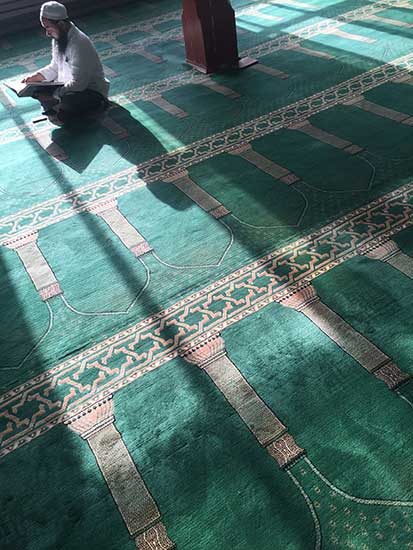Full coverage: Xinjiang: Exploring China’s New Frontier
We continue with our special series on Xinjiang. Around one in ten Chinese practices a religion. The principal religions are Buddhism, Taoism, Islam, and Christianity. Islam alone has around 21 million followers in China. And with some 25,000 mosques, Xinjiang is home to the country's largest Muslim population. China says it fully respects the freedom of religious beliefs, and that its commitment "cannot be matched by any other period in China's history."
The government also says it firmly opposes any attempt to politicize religious issues. China refutes reports by some western media that fasting was banned during the holy month of Ramadan. In today's episode, reporter Han Bin documents the last days of Ramadan at one mosque in Bachu County.

During Ramadan, Muslims are required to refrain from eating and drinking from dawn until sunset.
Ramadan is about dedication. And this doesn't apply to men only. Amina Ismayil and her daughter Patime Abudukerim, prepare the daily Suhoor, or the last meal before sunrise. This will have to sustain them for 15 hours.
"I hope to help Ramadan start well and end well. This is the sacred mission from God. With my gratitude to God, I will do a good job for the prayers. After a whole month of fasting, people should be cleansed of their sins and hatred. The community should usher in peace and harmony. This is the meaning of Ramadan to me," Abdukerim said.
Abdukerim has been the Hatifu, or senior Imam, of Bachu's biggest mosque for 15 years. He began studying Islam when he was 8. To him, Ramadan is one of the most important times in the Muslim calendar.
During Ramadan, Muslims are required to refrain from eating and drinking from dawn until sunset.
They pray 5 times a day, facing the direction of Mecca. The Uyghur Autonomous Region is home to half of China’s Muslim population.
"Fasting will nurture one’s spiritual mind, to understand the plight of the poor, and bridge the gap between hunger and satiety," Abdukerim said.
Abdukerim’s mosque—the Id Kah in Bachu, has a history of 150 years. It has been refurbished several times over the years. Worshippers can number as many as ten thousand during religious holidays.
China’s far western region of Xinjiang is home to some 10 million Uygur Muslims. Ramadan is widely observed here. The fast is a central tenet of Islam. Believers say it’s all about self-discipline, generosity, and sincere faith.
Special evening prayers are conducted, with long portions of the Qur’an recited. They are known as the Taraweeh.
The holy month is a special period of discipline and worship.
Muslims pray throughout the day and night.
After a month of fasting, comes the time for rejoicing and renewed hope.
A communal prayer is conducted, to mark the end of Ramadan.
This is the beginning of Eid al-Fitr, their biggest celebration.
Bachu once suffered from extremist activities, and many are hoping the spirit of Ramadan can bring lasting peace within their communities.
"If I am still alive next year, I will be grateful to observe Ramadan whole heartedly like this year," Abdukerim said.
Abdukerim is grateful that Ramadan has brought his whole family together. He hopes such harmony will ensure prosperity within Bachu, and the wider society around them.















